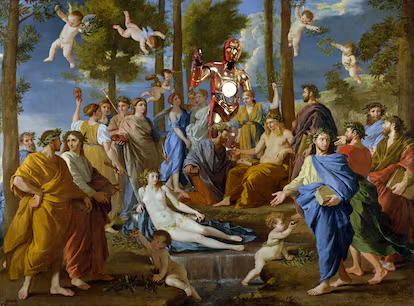ChatGPT vs poetry: can artificial intelligence write in verse?
AI has already revolutionized our lives. With a few simple instructions, the technology is able to create complete texts, without plagiarizing a single phrase from the internet. But is it capable of writing a good poem?

Franz Kafka once wrote a short story titled A Report to an Academy, in which a monkey gains human intelligence and gives a lecture about its past as a wild animal.
Something similar happens when you ask ChatGPT about its own limitations: ”Are you capable of writing a good poem?” The language model – which doesn’t flinch upon being asked anything – replies: “While it’s possible to create poetry without a human author, most of the poetry considered relevant and significant is usually created by a poet with a distinctive identity and voice.”
The technology acknowledges – with great tranquility – that the work of an author who lacks biographical interest usually doesn’t arouse much feeling in readers.
Since it was launched a few months ago, ChatGPT may go on to become the most prolific poet in the history of literature. Thanks to immense deep learning neural networks, the technology is capable of writing texts in a few seconds, based on very simple instructions and without plagiarizing a single sentence from the internet. However, the AI cannot legally be considered to be the author of these works.
“Perhaps a machine can create art… but it won’t be protected by intellectual property law, because for this to occur, there must be an author. As such – except in rare cases – only [human beings] can be authors,” says Mario Sol Muntañola, a lawyer and expert in intellectual property.
Guillermo Marco and Julio Gonzalo – researchers in the field of Natural Language Processing at Spain’s National Distance Education University – have spent years investigating the limits and capabilities of large language models such as ChatGPT. They declare themselves skeptical of “the hype” surrounding this technology.
“These models work like networks of artificial neurons, which are like our brain. What they do is learn to write through a cognitive simulation of how we read,” explains Marco, also author of the collection of poems titled Other Clouds, for which he received a poetry prize in 2019.
In one of their first experiments, Marco and Gonzalo asked a group of participants to rate six aspects of the synopses of books and movies that this artificial intelligence produced.
“We gave [each product] an invented name and the machine created a plot for that title,” explains Gonzalo. The result was that the language model scored better than the humans in all sections… except creativity. The researchers subsequently decided to focus on this specific aspect and changed the objective of the study.
“We started experimenting with poems, because synopses – at least for humans – aren’t intrinsically creative texts,” the men note.
Before measuring the results, they proposed to extract a definition of what users understood creativity to mean.
“For each person, it’s something different… but almost all of them agreed that creativity was the original, the unusual – what they had never seen before,” Marco explains.

The duo concludes that these language models are not designed to be particularly creative.
“They’re made to imitate rather than be original. They learn to say the least surprising thing,” they affirm.
Marco illustrates this with an example: “If you give [the AI] a sequence – ‘The sky is...’ – and you ask it to complete the sentence, of the 50,000 words [the technology] has learned, it will always choose the word “blue,” because it’s the most common.”
ChatGPT’s priority, they explain, is to preserve the meaning of the text – which makes it difficult for a sentence to be esthetically striking.
“It turns out that there are people who ask the machine questions that already have such a high component of originality that [the AI] has no choice but to improvise,” Gonzalo specifies. “I read an example where someone asked ChatGPT to write a Bible-style story about a person who has stuck a sandwich in the slot of a VHS player. The result was hilarious.”
It’s also important to note that ChatGPT doesn’t understand the words it learns.
“All [its] knowledge is intuitive – based on reading, it learns what language is. But [the AI] doesn’t have the capacity for reflection or rational thought. That’s precisely why it learns to imitate sonnets, but it’s not capable of explicitly realizing that there’s a rule that relates a certain type of rhyme to a certain number of verses,” Gonzalo adds.
Marco emphasizes that these language models will always be limited to the input sequence – that is, to the instructions given by a human being.
“The [large language models] will never have an original idea, they’ll never have intention. That intention, for the moment, will always come from a human. What would be truly artistic is for [the AI] to refuse to write, or to decide to write [the prompt] in its own way.”
In his book – Uncreative Writing: Managing Language in the Digital Age (Columbia University Press) – Kenneth Goldsmith writes: “Perhaps the great authors of the future will be those who can write the best programs to manipulate, analyze and distribute the practices of language.” This raises the possibility that literature will become a collaboration between machines and humans – a process that doesn’t try to replace human creativity, but bolsters it.
The writer Jorge Carrión – who has published widely about ChatGPT-2 and 3 – has analyzed The Magnetic Fields, a book of poetry by André Breton and Philippe Soupault. Published in 1919, it is considered to be the birth of automatic poetry – writing without conscious control or censorship. Carrión compares the arrival and influence of the surrealist literary movement in the first decades of the 20th century with the expansion of large language models.
“If the transition between conscious and unconscious writing characterized those years, writing produced by machine learning and other forms of artificial intelligence is giving ours a particular vibe.”
In a conversation with EL PAÍS, he says that “algorithms write very well – they write almost perfectly, they access areas that are off-limits to humans – but they are still incapable of brilliance, of metaphor, of knowledge of the best poetry. This doesn’t mean that they don’t write better than many poets, [like] poet-influencers.”
However, he doesn’t hesitate to state that the arrival of a technology capable of writing good literature is only a matter of time.
“The intelligence of algorithms, robots, neural networks, or programs or formulas that artificial intelligence doesn’t yet have… may end up being capable of metaphor and irony, in new and undoubtedly literary forms.”
Sign up for our weekly newsletter to get more English-language news coverage from EL PAÍS USA Edition
Tu suscripción se está usando en otro dispositivo
¿Quieres añadir otro usuario a tu suscripción?
Si continúas leyendo en este dispositivo, no se podrá leer en el otro.
FlechaTu suscripción se está usando en otro dispositivo y solo puedes acceder a EL PAÍS desde un dispositivo a la vez.
Si quieres compartir tu cuenta, cambia tu suscripción a la modalidad Premium, así podrás añadir otro usuario. Cada uno accederá con su propia cuenta de email, lo que os permitirá personalizar vuestra experiencia en EL PAÍS.
¿Tienes una suscripción de empresa? Accede aquí para contratar más cuentas.
En el caso de no saber quién está usando tu cuenta, te recomendamos cambiar tu contraseña aquí.
Si decides continuar compartiendo tu cuenta, este mensaje se mostrará en tu dispositivo y en el de la otra persona que está usando tu cuenta de forma indefinida, afectando a tu experiencia de lectura. Puedes consultar aquí los términos y condiciones de la suscripción digital.









































